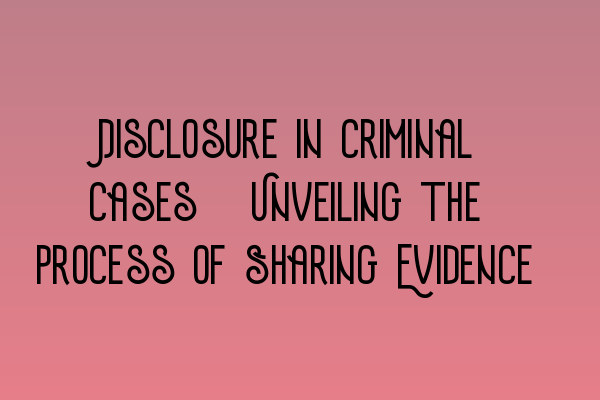Disclosure in Criminal Cases: Unveiling the Process of Sharing Evidence
When it comes to criminal cases, one of the most crucial elements is the disclosure of evidence. Disclosure refers to the process of sharing all relevant information and evidence with the defense by the prosecution. This allows both parties to adequately prepare their cases and ensures a fair trial. In this article, we will take a comprehensive look at the disclosure process in criminal cases, its importance, and the challenges it presents.
The Importance of Disclosure
Disclosure plays a fundamental role in upholding the principles of justice and fairness in criminal cases. It ensures that all parties have access to the same evidence, enabling the defense to challenge the prosecution’s case and reducing the risk of wrongful convictions. The disclosure process aims to promote transparency and provide a level playing field for both sides.
In order to ensure effective disclosure, the Criminal Procedure and Investigations Act 1996 sets out certain obligations on the prosecution. These obligations ensure that the prosecution shares all relevant evidence, including favorable evidence that may assist the defense, known as the “unused material.” The prosecution must also disclose any material that undermines its case or supports the defense, such as witness statements, expert reports, and CCTV footage.
The Process of Disclosure
The disclosure process in criminal cases is typically divided into three stages:
Initial Disclosure
During the initial stage, the prosecution must disclose the primary evidence they intend to rely on at trial. This includes items such as witness statements, expert reports, and any other material that forms the basis of the prosecution’s case. The defense team can then assess the strength of the prosecution’s case and begin developing their defense strategy.
It is important to note that the prosecution has an ongoing duty to disclose any new evidence that emerges after the initial disclosure. This ensures that both sides have access to the most up-to-date information throughout the course of the case.
Continuing Disclosure
Continuing disclosure occurs as the case proceeds and new evidence is gathered by the prosecution. This includes any unused material that is potentially relevant to the defense. The prosecution must actively review and disclose such material, even if they believe it may not significantly impact the case.
The defense team should also actively engage in the disclosure process by making specific requests for material they believe is relevant to their case. This helps ensure that all relevant evidence is disclosed and provides the defense with a complete picture.
Third-Party Disclosure
In some cases, there may be third parties who possess relevant evidence that should be disclosed. These third parties may include witnesses, experts, or other individuals who have information about the case. The prosecution has a duty to identify and disclose this evidence to the defense, allowing them to evaluate its significance and potentially call these individuals as witnesses in their defense.
Challenges in Disclosure
While disclosure is a critical aspect of the criminal justice process, it is not without its challenges. One of the main challenges is the volume of evidence involved in some cases. Particularly complex cases can result in an overwhelming amount of evidence that needs to be reviewed, assessed, and disclosed. This can lead to delays in the disclosure process and potential issues with meeting court deadlines.
Another challenge is the identification of sensitive and confidential information that may be subject to legal privilege or risk compromising national security. In such cases, the prosecution needs to balance the duty of disclosure with the need to protect certain information. This requires careful consideration and consultation with relevant authorities to ensure a fair trial while protecting legitimate interests.
Conclusion
Disclosure is an essential part of the criminal justice system, ensuring fair and transparent trials. It allows both the prosecution and defense to fully understand and evaluate the case against the accused. While the process of disclosure may present challenges, it is crucial for upholding the principles of justice. As legal professionals, it is our responsibility to ensure that the disclosure process is conducted thoroughly and fairly, protecting the rights of all parties involved.
If you found this article informative, you may be interested in reading more about related topics:
- Legal Representation for Delaware LLCs in the UK: Expert Advice
- Legal Challenges for UK Businesses in the U.S.: Strategies for Overcoming Hurdles
- Legal Challenges for UK Businesses in the U.S.: Strategies for Overcoming Hurdles
- SQE Exam Prep: Essential Study Materials for Aspiring Solicitors
- Expert Testimonies in UK Courts: Building Strong Cases
